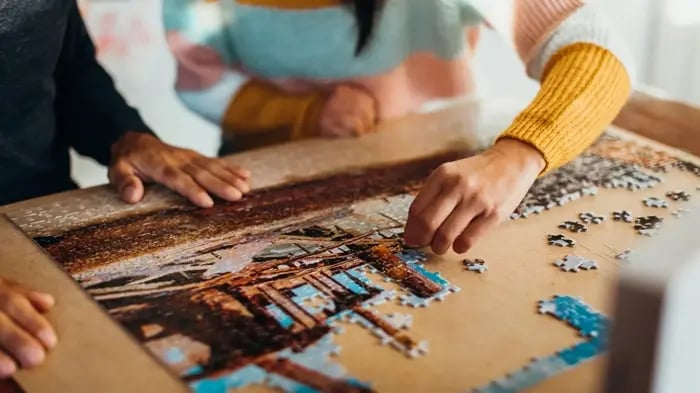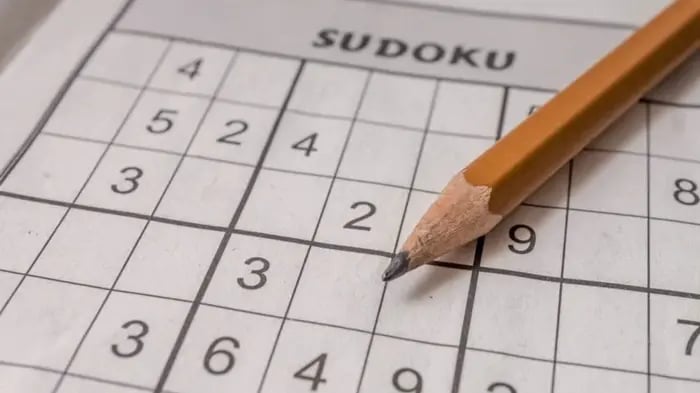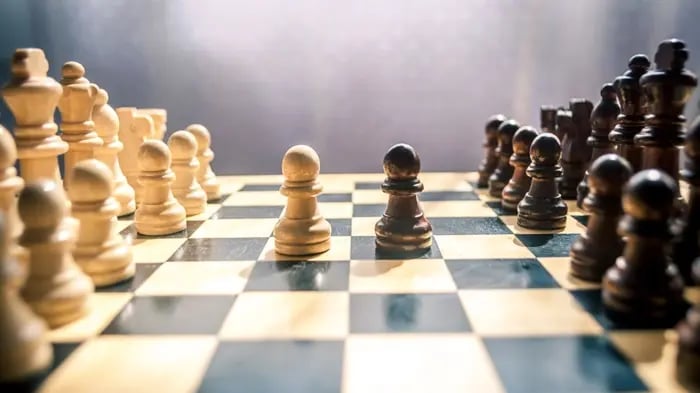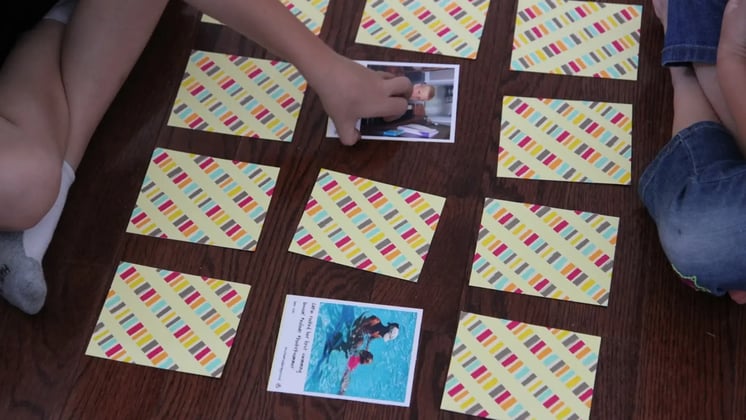- Story Chain
- I Spy
- Spot The Differences
- Jigsaw Puzzles
- Reverse Simon Says
- 20 Questions
- What’s Missing From the Memory Tray?
- Sudoku
- Chess
Introduction
Razor-sharp memory and focus are characteristics that every parent wants to imbibe in their child, especially in the age of digital distractions. The brain is just like a muscle; it needs to be exercised daily to be kept in proper shape and form. And this exercise does not come from studying for hours. It comes from participating in activities and games that hone your kids’ focus and sharpen their memory.
Since focus and memory are not fixed traits, they need to be engaged regularly to maintain and sustain their functioning. With the dimming of festive lights, the final school term starts to gather pace. This phenomenon also allows many Indian parents to notice a familiar challenge: keeping their child’s concentration sharp amidst distractions.
In a world saturated with all kinds of digital content, the core skills, memory, and focus are more important than ever. Not only for academic success but also for overall cognitive wellbeing. In a 2018 study published by Medical Science Monitor Basic Research, it was found that subjects who regularly engaged in brain training games for a short period outperformed the rest in terms of attention, processing speed, visual memory ,and executive functions. But these skills must be inculcated in kids without adding more pressure to their already hectic schedules. The best approach is to opt for the form of play and games. Not only will they relax your kids after tuition and homework, but they will also encourage them to be challenged while also having fun.
9 Fun Games That Enhance Memory And Focus In Kids
Story Chain
This game is easy for kids of all ages. They can start a story with a single sentence, like "A little monkey in a bright red cap was sitting under a mango tree and selling fruits." The next person has to repeat the sentence before adding their own. The chain continues, with each player reciting the entire story so far before adding their own line.
This simple game is a great exercise for auditory memory and sequential processing. Children must listen carefully and hold an ever-growing narrative in their minds. It also fuels creativity and language skills, making it a perfect game for long car rides or during power cuts.
I Spy
This game is simple and fun. One kid should start by saying, “I spy with my little eye something that is [color/shape/texture],” and the others should take turns guessing what the object could be. For example, “I spy with my little eye something blue.” It is a fantastic game for improving attention to detail and developing observation skills in little kids, just like a movie spy! “I Spy” works on visual memory and teaches kids to be alert and aware of their environment
.
Spot The Differences
This game is a newspaper/magazine favourite among kids and adults alike! These puzzles, which present two almost identical images, require keen observation to find the subtle differences. It is a direct exercise in attention to detail and visual scanning for children. Such activities improve "visual discrimination" in little kids, developing a skill crucial for learning to read and avoiding careless errors in schoolwork.
Jigsaw Puzzles

Don’t underestimate the power of a good old-fashioned jigsaw puzzle. Even online puzzle games offer the chance to explore a huge range of possible solutions based on past experiences and intuitions, as explained by a 2014 article published by the American Psychologist. Pick a puzzle with a piece count and image complexity that is challenging but suitable for your child's age and maturity. Puzzles offer the ultimate brain workout. They enhance spatial reasoning, pattern recognition, and problem-solving skills in kids. The act of sorting pieces by colour or edge type and the trial-and-error process of fitting them together builds both patience and sustained focus. Both are crucial skills that must be inculcated in young children.
Reverse Simon Says
The familiar game of "Simon Says" is a brilliant tool for honing listening skills. To ramp up the challenge, it is fun and challenging to add a reverse rule: for example, if you say "Banana says," they ‘should’ do the action, and if you say “Simon Says” then they must not act. This game is a direct challenge to a child's impulse control and executive function. Kids must listen intently, process the instruction, and inhibit the automatic response to act unless the magic words are used. This ability to pause and think is a cornerstone of focused learning.
20 Questions
20 Questions is a brilliant exercise in systematic recall and categorization. The players asking questions must actively search their memory for all possible items within a broad category (animal, vegetable, mineral, etc) and then apply deductive reasoning to eliminate possibilities based on the answers of their friend or sibling. The core mental challenge here lies in remembering all the previous questions and answers – a mini-memory test with every round, to ensure no logical steps are repeated. This practice of organized, focused information retrieval directly translates into better studying and test-taking habits in kids as they grow up.
What’s Missing From the Memory Tray?
For this creative game, make a memory tray first, by loading it up with various household items and personal toys that interest your kids. Then hold out the tray in front of them for a few moments, to let your kids observe and remember as much as they can about its contents. Then ask your kids to shut their eyes and remove an item from the tray. Now hold it in front of them again and ask them to identify the missing object. This game allows kids to improve their visual memory and attention to detail as they rack their brains to remember.
Sudoku

A staple in almost every Indian newspaper, Sudoku is far more than just a pastime for older kids and adults. The simple 4x4 or 6x6 grids designed for children are an excellent entry point into the exciting world of numbers and patterns. Sudoku is nothing but pure logical deduction. It trains the brain to recognize patterns, use working memory to track potential number placements, and maintain intense focus from a very young age in children. The process of elimination is a foundational skill required for both maths and science.
Chess

A game of chess is essentially one of the best workouts for the developing brain. To play even reasonably well, a child must hold multiple pieces of information in their mind simultaneously: be it the rules of movement for each piece, the opponent's last move, or at least two or three potential lines of attack and defence. This constant mental balancing act—planning several moves ahead while remembering the history of the game—dramatically strengthens your child’s intrinsic ability to concentrate. Also, the mandatory quiet and the need to sit still for extended periods directly cultivates patience and impulse control. In such cases, even if your kids play it online, the pros are far greater than any cons. Such skills are paramount for long-term focus in an academic setting for children.
Conclusion
Try incorporating these games into your child’s weekly routine. They will offer a joyful, connection-building alternative to screen-based games and apps. They will also help lessen their blue light exposure. The shared laughter and gentle competition while playing games with friends and family do more than just build cognitive skills. They also build stronger family bonds. By making playtime a priority, you are giving your child some of the most powerful tools to develop a resilient, sharp, and focused mind.
Kaushiki Gangully is a content writing specialist with a passion for children's nutrition, education, and well-being. With more than five years of writing experience and a science-based background, she provides nuanced insights to help families raise happy, healthy kids. Kaushiki believes in making learning and healthy eating fun, empowering parents with practical, easy advice.
The views expressed are that of the expert alone.
The information provided in this content is for informational purposes only and should not be considered a substitute for professional medical advice, diagnosis, or treatment. Always seek the advice of your physician or another qualified healthcare provider before making any significant changes to your diet, exercise, or medication routines. This is a sponsored article.
References
















